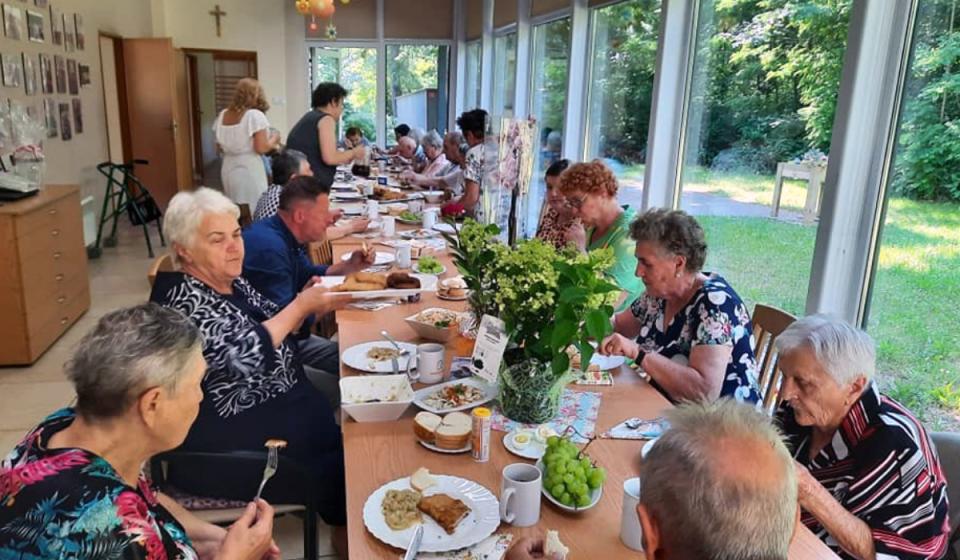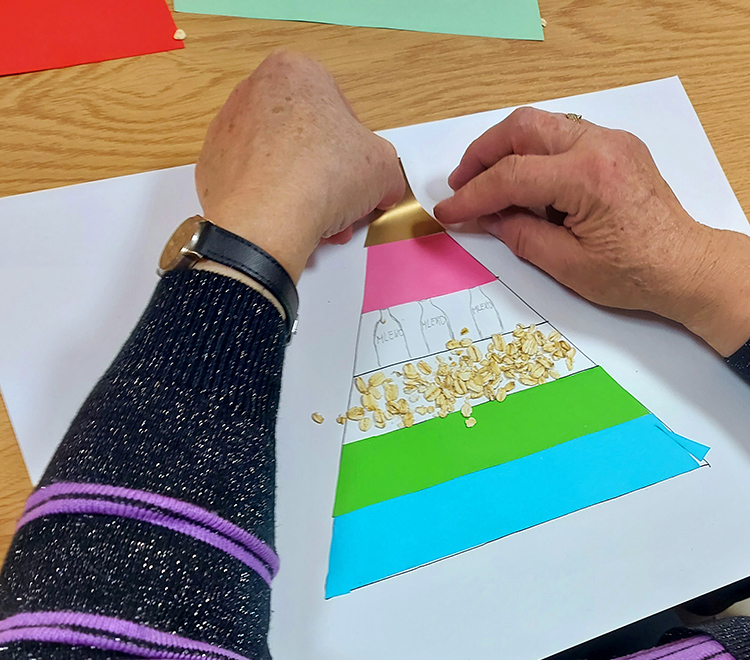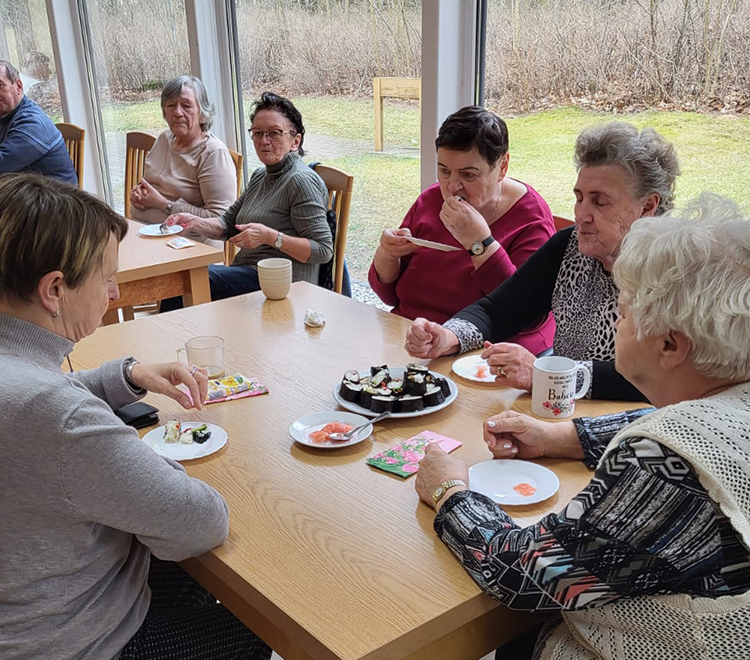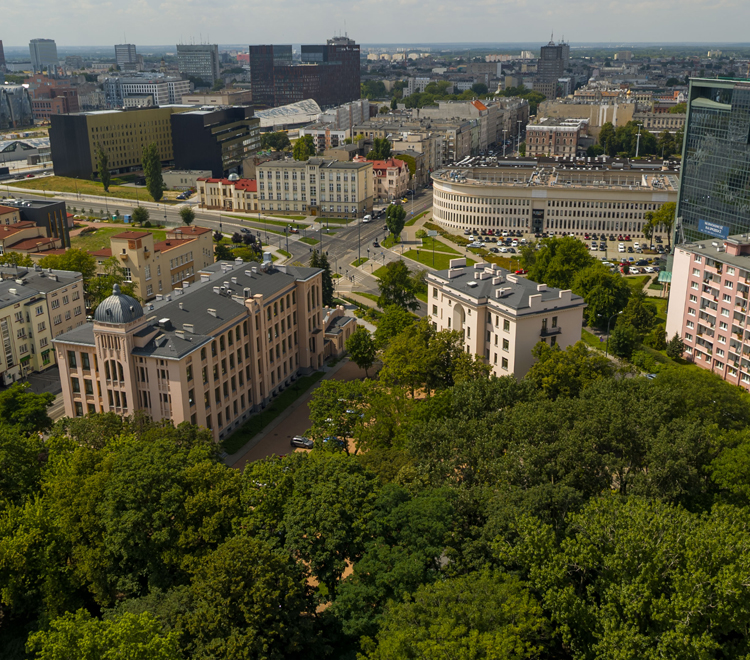The University of Łódź, as the Polish partner of the FEAST project, coordinates a Living Lab located in Tuszyn, a small town of 7000 inhabitants located in Central Poland, 15 kilometers from the southern boarders of Łódź City. Our Living Lab represents a category of public institutions and operates within the environment of the Senior-WIGOR Day Care Centre. Our Senior Home is part of a chain of day-care institutions for elderly people financed by the Ministry of Family and Social Policy within the second edition of the Senior+ governmental programme (2021-2025). It is a safe and friendly test environment where the Polish FEAST team designs and applies numerous interventions to improve seniors’ diets, both inside and outside the facility.
Who we would like to support
Our Living Lab's primary objective is to investigate the eating habits of senior residents, examine the quality of meals provided on-site, spread practical and theoretical knowledge on healthier and more sustainable diets, devise and implement interventions crucial for the improvement of the community's eating culture and map out recommendations useful for upscaling the results of the research process. The main assumption of our actions within the FEAST project is that elderly people have specific dietary and nutritional needs and that their eating habits affect the quality of aging processes. Our test environment consists of twenty-one residents of the Senior Home, 18 women and 3 men of age range from 60 to 96. Apart from senior residents, the manager of the facility, the staff of the institution (caretakers), the provider of meals (local vocational training institution employing people with a low or moderate degree of intellectual disability) and the local authorities (the Mayor of Tuszyn and his partners) may be classified as a widely understood “target group” of our actions, lobbying, trainings, and meetings.
What’s coming next
Among various activities and tasks planned for the next year, several of them are worthy of mentioning:
- A professional nutritionist specializing in geriatric needs has been involved in the FEAST project to prepare a written expert opinion on the quality of meals served in the Senior Home in the last quarter of 2024;
- A successful initiative “Yoga with healthy breakfast for seniors” will be continued;
- A big public event (“Intergenerational picnic”) is going to be organized in Tuszyn in April 2025, its main purpose is to promote healthy food choices among local communities;
- An interview with the local authorities (the Mayor or/and the Vice-Mayor of Tuszyn) on the opportunities to tighten cooperation on seniors’ education and healthy lifestyles will be conducted;
- The catalog of best practices for other ministry-funded day-care senior homes in Poland is planned to be prepared and published;
- An open webinar for Senior Home managers is planned to be organised;
- Continuing the holistic approach to FEAST interventions, another round of voluntary psychological support sessions/counselling will be offered to seniors;
- The fruit/veggie garden will be expanded and supplemented by a variety of new seedlings.
Local Food Challenges
One of the challenges clearly visible in scientific literature and in statistics is the relatively low consciousness and interest in organic food among Polish consumers. “In a Society, the awareness of the importance of organic production for society is growing. However, the interest in organic products appears to be still relatively small’ (Organic Food Market in Poland, DOI: 10.1515/saeb-2016-0111). ‘The factors limiting the purchase of [organic food] include, among others: limited availability, high prices, and lack of sufficient knowledge about organic products (Hjelmar, 2011; doi: http://dx.doi.org/10.1016/j.appet.2010.12.019). Similar observation results from the series of interviews conducted with the residents of the Senior Home, the majority of whom declare not knowing the term «organic food». Another knowledge gap refers to the concept of «sustainable diet», which is often mistakenly associated and treated as a synonym with «balanced diet», not necessarily understood in a broader, environmental, and eco-friendly way. That is why proper education and consciousness-raising among older people is an important pillar of our Living Lab interventions.
- READ FULL TEXT
Another local challenge that was diagnosed in the Living Lab at the early stage of the FEAST project is the insufficient consumption of fresh vegetables, fruit, and herbs among the residents of the Senior Home. One of the first interventions of the Polish FEAST team was setting up a vegetable garden that seniors cultivate on their own. Apart from that, several complaints have been raised by the interviewees concerning the quality of meals provided in the facility. Vegetables are commonly served in the form of poorly chopped, hard-to-chew, and raw salads (mostly cabbage) and are regularly thrown away by seniors, discouraged and unwilling to taste them. Vegetarian or vegan meals are almost non-existent in the weekly menus. That is why another intervention of the local FEAST team is to modify the content of the tender announcement (including more detailed and stricter criteria for meal composition and preparation). The current provider of meals has been informed about seniors’ concerns and feedback. From January 2025, new requirements, suggested by the FEAST team members, are in power and the provider of meals is obliged to follow them.
Living Lab Activities
In 2023-2024, the Polish FEAST team has initiated various activities. First of all, twenty in-depth, semi-structured, individual interviews have been conducted with the residents of the Senior Home. The interviews helped to diagnose the current weaknesses and strengths of the meal provision system, including important remarks on the quality and form of the meals provided on-site. Having diagnosed, among other things, a relatively poor intake of fresh herbs and veggies, the FEAST team established two vegetable garden patches in the area of the facility. The first on-ground garden bed was installed in spring 2023. Seniors successfully cultivated cherry tomatoes, zucchini, pumpkins, beetroots, garlic, lovage, mint, basil, and chive. Due to physical impairments of some of the residents, and their inability to bend down or knee, in June 2024 an improved, elevated garden patch has been designed, produced, and installed, with a new range of seedlings including strawberries, lemon balm, stevia, rosemary and sage. What is also important from the viewpoint of the project milestones is that in the last quarter of 2024...
- READ FULL TEXT
the FEAST team successfully modified the procurement procedure for providing meals to seniors by an external provider. Due to our intervention and consultancy, new pro-quality requirements have been added to the content of the tender announcement. From January 2025 on, there will be a legal basis and formal possibility to check, control and, if necessary, complain about the quality of meals served. Among other actions, the FEAST team offers a variety of mini-lectures and practical trainings designed for the residents and staff of the Senior Home. These include, among others, psychological workshops and counseling, theoretical knowledge on special nutritional needs of elderly people, practical workshops combined with tasting (e.g. how to prepare green cocktails, Asian cuisine, the role of spices and herbs in diets, etc.). Among major plans for 2025, there is a series of meetings with a certified yoga instructor named “Yoga with healthy breakfast for seniors”, further expansion of the garden (fruit trees and shrubs), organizing a public event “Intergenerational picnic”, preparing written expertise on the quality and nutritional value of the meals by a professional nutritionist, and others.
Get to know the region
Tuszyn is a small town of 7000 inhabitants located 15 kilometers south of the city of Łódź – a metropolis of 700,000 located in the center of Poland. Both, the town of Tuszyn and the city of Łódź belong to Łódź Voivodeship. Łódź Voivodeship represents one of 16 administrative regions in Poland with a population of 2,4 million inhabitants. The region has a long tradition of producing clothes and textiles, with its historical peak in the 19th century (Łódź is often called “the Polish Manchester”). Łódź Voivodeship is located in the very center of Poland, at the intersection of the European North-South and East-West highways (A1 and A2). Łódź is an important academic center with 6 major public higher education institutions (University of Łódź, Łódź University of Technology, the Medical University of Łódź, The Academy of Fine Arts, and the National Higher School of Film, Television, and Theatre). More than 64 thousand students study in Łódź annually, 26 thousand of whom choose the University of Łódź. Geographically, Łódź Voivodeship is located on the border of two large geomorphological units: the Central European Lowland and the Polish Uplands. It is dominated by vast and flat plains. The structure of land use, according to 2020 data, is dominated by agricultural land (71,2%), forest land (21,7%), urbanized land (6,1%) and others (1%). When it comes to agriculture, the Łódź region is the leading producer of potatoes in Poland. It is a significant producer of rye, fruit, field vegetables, and cereal mixtures, in the production of which its share is over 10%. It also plays a significant role in the domestic production of triticale, sunflower seeds, oats, and corn (Wójcik & Traczyk, 2016). Łódź Voivodeship, due to its location in the heart of Poland and due to rich history and culture (the industrial Łódź of the 19th century was formed by four nations – Poles, Germans, Jews, and Russians) attracts many investors and tourists.
Frequently asked questions
- When was the living lab established, and how has it evolved over time?
Senior-WIGOR Day Care Centre was established in December 2015 under the first round of the Government Program for Social Participation of Senior Citizens (ASOS 2014-2020). It offers twenty-one places for people over 60 years old, who are not economically active. In case of high interest, priority is given to single people with low incomes and living in poor housing conditions. The facility agreed to enter the FEAST project and function as a testing environment (a Living Lab) in Autumn 2022.
- Who are the key stakeholders involved in the living lab?
“We – You – They” Vocational Rehabilitation Facility – an institution employing mild to moderate intellectually disabled people performs as the main provider of meals to the Living Lab.
Tuszyn authorities – the Mayor and the Vice-Mayor – Senior-WIGOR Day Care Centre, as a publicly funded local institution, remains in close cooperation with the municipality and its management.
University of Łódź – FEAST project team members represent three different faculties (Faculty of Philology, Faculty of International and Political Studies, Faculty of Management) and engage other staff members and students in order to accomplish research activities and interventions in the Living Lab.
- What activities are conducted in the living lab, such as workshops, seminars, conferences, or hackathons?
Workshops (psychological, educational, occupational therapy, art workshops, yoga classes etc.)
Performances and social gatherings (talent shows, amateur theatre performances, theme parties)
- What research has been conducted in the living lab, including studies on user behavior, user experience design, and product design?
To be announced (two scientific articles in progress)
- What facilities and resources are available in the living lab, such as office space, laboratories, and research equipment?
Access to a modestly equipped kitchen (preparing basic meals is possible). Access to Internet, laptop, loudspeakers, projector. Spacious room for workshops. Small office equipment. Voice recorders belonging to the University.
- What initiatives has the living lab undertaken, such as industry collaborations, funding programs, or outreach efforts?
Polish FEAST team acquired additional financial resources for the implementation of initiatives in the Living Lab from the Ministry of Science and Higher Education programme “Initiative of Excellence - Research University» (IDUB) for the period of 12 months (April 2024 – April 2025).
- What lessons have been learned from the living lab, including successful strategies, challenges faced, and areas for future improvement?
Lesson learned: having installed the on-ground veggie garden patch, the FEAST team realized that bending down and weeding a ground-level patch may be physically difficult for older people. It also excludes wheelchair users from enjoying garden activities. As a response, an elevated patch has been designed, produced, and installed.
Challenges encountered: in a series of interviews the residents of the senior home reported problems with consuming raw salads that were chopped too coarsely. The first communication with the provider of meals brought only temporary improvement. After a few months from our complaint, hard, raw, and unseasoned salads based on white cabbage appeared again in the menu on a regular basis. Together with the Manager of the facility, we made an effort to change the content of the tender announcement and include additional, pro-quality requirements referring to both, the composition, and the preparation of meals. Now, the provider of meals is obliged to meet the formal criteria.
Women’s Studies Centre, University of Lodz
Aleksandra Różalska
Faculty of International and Political Studies, University of Lodz
Kaja Zapędowska-Kling
Faculty of Management, University of Lodz
Artur Modliński
Testimonials from our community
It is not the first time the University of Łódź visits our institution for research and data. However, the presence of the FEAST project team has changed everything. Neither me nor the seniors have expected such a long-standing engagement and commitment. We feel the exchange of knowledge and experience is mutual. Our residents open themselves in individual interviews. They like and trust the team members. Tens of joyous workshops and events have been organised by Aleksandra, Kaja & Artur. Not only the garden, which is regularly extended, but also practical guidance on healthy breakfasts, green cocktails, spices & herbs, vegan alternatives. People at that age are rarely open to innovation, but our seniors taste everything, do the yoga exercises, meet foreign students, and ask plenty of questions. I, as a manager, am also inspired to pay more attention to the weekly menus and initiate a dialogue with the meals’ provider.




